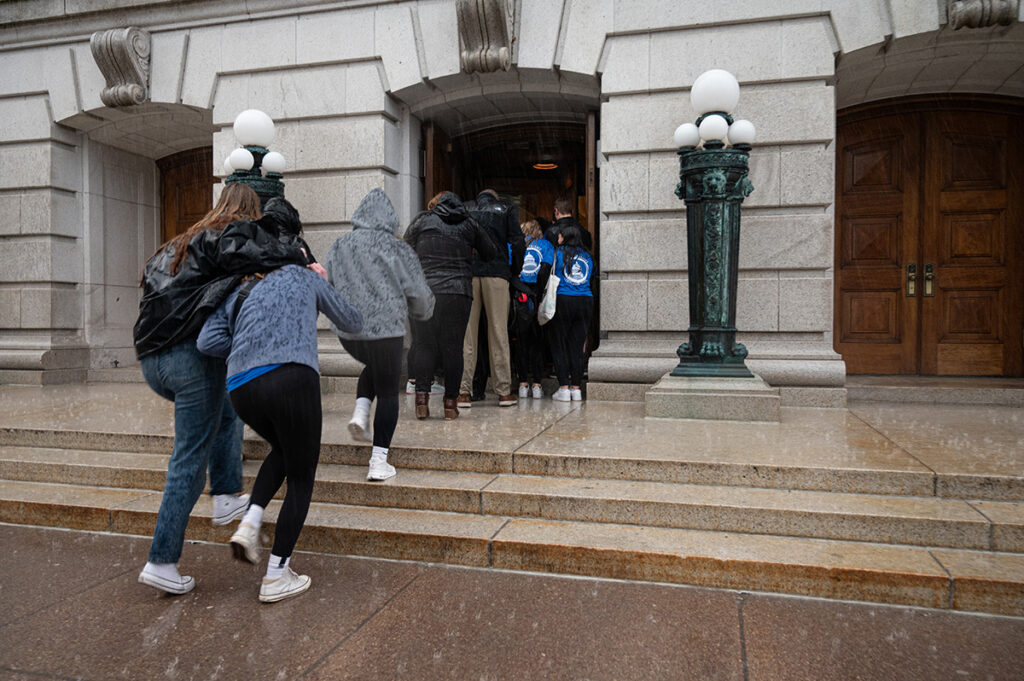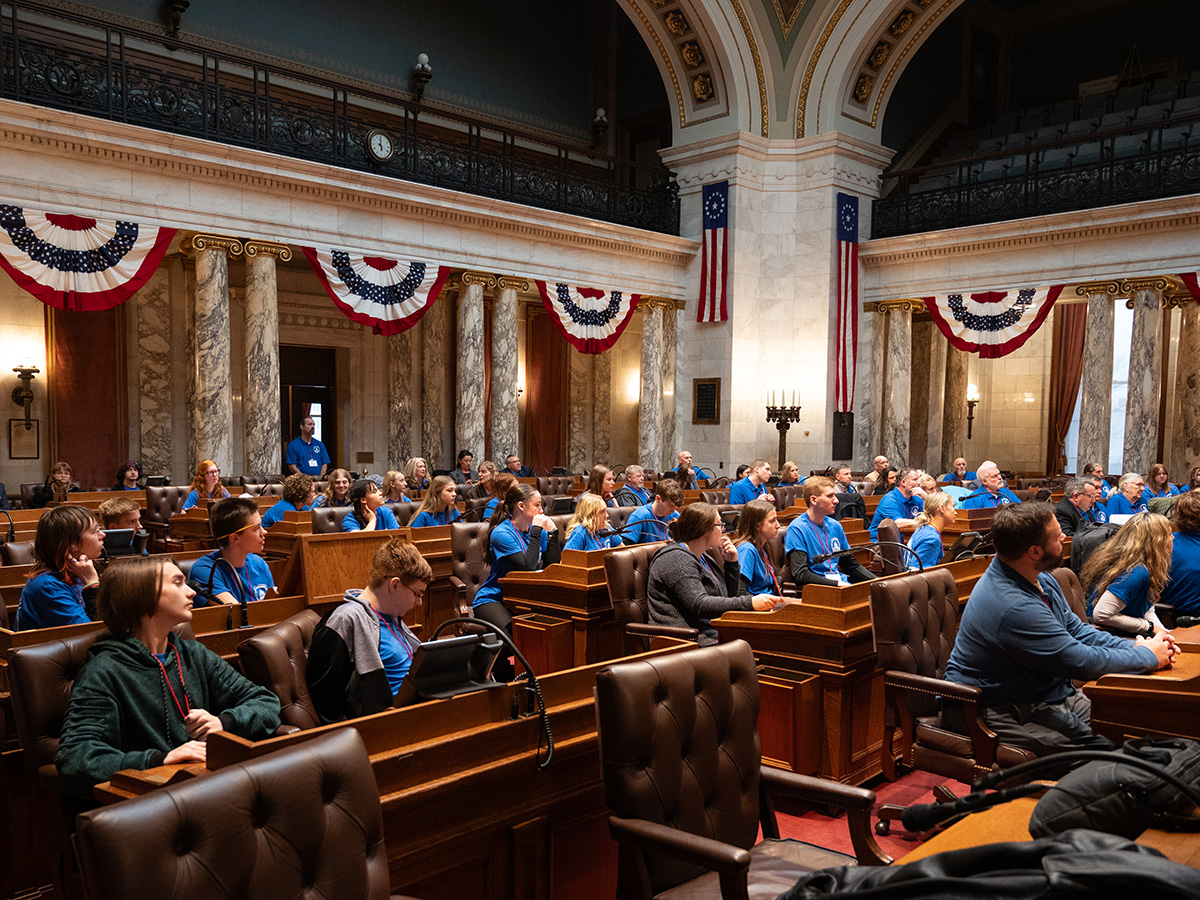A delegation of at least 80 Door and Kewaunee County residents, including high school students, public officials and business owners, headed to Madison on March 19 and 20 to lobby for legislation that would positively impact the quality of life for both counties’ residents.
Delegates brought nine legislative proposals to lawmakers that address four key areas identified as crucial to the region’s economic development. Delegates lobbied for legislation supporting affordable housing, child care, environmental protection and local health care.
It is not just the peninsula, but the entire state of Wisconsin that stands to benefit from issues raised at Door/Kewaunee Legislative Days, according to County Board Supervisor Bob Bultman. Bultman represents District 12, including Baileys Harbor and Jacksonport. He has attended the event, which occurs every other year to coincide with the state Legislature’s budget session, as both a public official and private citizen for many years, he said.

Photo essay: Local students brave rain, wind, snow and ice to advocate for residents at Door/Kewaunee Legislative Days
Half of the delegation were Door County high school students from Gibraltar, Sturgeon Bay and Southern Door schools. The Door County Economic Development Corporation’s business and education teams contact schools and work with them to get students to attend, according to Executive Director Michelle Lawrie. See the photos by clicking here.
The event began in 2003 and is currently organized by the Door and Kewaunee County Economic Development Corporations. The delegation brings an agenda of specific concerns from the communities directly to elected representatives and government appointees. They do not just meet with representatives for Door and Kewaunee counties, but with legislators from around the state.
One of the goals of the event is to educate all state lawmakers about the region, according to Michelle Lawrie, executive director of the Door County Economic Development Corporation.This year, the delegation split into small groups to meet with more than 100 elected officials and state staffers about various topics.
On this year’s agenda
Agenda topics are submitted by county citizens and narrowed down by a steering committee made up of community members who attend Legislative Days regularly. This year’s steering committee included Door and Kewaunee county administrators, local business owner Charlie Henriksen, Brian Kelsey from Peninsula Players, and economic development staff from both counties.
DCEDC put out a press release in January to open the call for issues to be submitted. “It’s kind of a tight timeline,” Lawrie said, indicating the window for submissions lasts two weeks. This is Lawrie’s second Legislative Days. The organization received at least 20 submissions, she said, including several about the Knowles-Nelson Stewardship program, housing and child care.
Some issues submitted were too specific to a small percentage of the population, Lawrie said, but the steering committee contacts everyone who submits an idea for follow-up.The goal for chosen topics, she said, is that they are as broad as possible while still specific in impact to Door and Kewaunee counties.
The topic selection process used to be “more comprehensive,” according to Henriksen, but he was happy with the agenda items chosen this year. Bultman said important issues like Tax Increment Financing expansion were included this year, but he would like to see more time spent on topic selection and development in the future.
“I would have liked them to get going sooner and to be a little more open and loud,” he said, regarding DCEDC promotion of Legislative Days. Bultman said he was happy with the agenda items this year, but more submissions and ideas from community members in the future will lead to a more robust pool of issues, and that’s a good thing.
“I always like maximum involvement,” he said.
This year’s submission process resulted in four areas being focused on. Those four areas were broken down into nine total actionable legislative items. Each delegate was issued a packet, with the nine items and their talking points, to bring into Capitol offices.
The four main issues listed in the packet were:
- Supporting affordable housing development
- Encouraging business investment in childcare
- Promoting environmental and recreational protection
- Strengthening local health care systems
Issues were developed into the following specific action items for delegates to present to legislators and encourage them to support:
- Expand the allowance for workforce housing developments within Tax Increment Financing Districts.
- Clarify the Business Development Tax Credit program to ensure a variety of business investments in housing would qualify for the tax credit.
- Clarify the Business Development Tax Credit program to ensure a variety of business investments made toward child care would qualify for the tax credit.
- Reauthorize the Knowles-Nelson Stewardship Program for 10 more years, with annual funding of $100 million. Current funding is at $33 million annually until 2026.
- Provide free access to state parks for Wisconsin’s 4th grade students and their families.
- Increase Medicaid reimbursement to hospitals.
- Increase state funding for the arts from 18 cents per capita to between 50 and 68 cents per capita.
- Ensure that both sport and commercial fishing industries have a role in shaping a final rule by the Wisconsin Department of Natural Resources to reestablish Lake Michigan’s commercial lake trout fishery and open a consumer market for lake trout.
- Maintain the current statewide school start date of Sept. 1.
There are only a few communities in Wisconsin that send delegates to Madison this way, according to Lawrie. Professional organizations and special interest or lobbying groups like the Tavern League of Wisconsin or Wisconsin Library Association make up the bulk of other Legislative Day participants. Each delegation goes to Madison on different dates during the state legislative budget session.
Bultman said he is grateful that Door and Kewaunee counties make this effort because it gives the region a leg up to solving problems and being truly engaged in the political process.
“Not everybody goes down to Madison and does this,” he said. “And so, you know, people remember us.”
Keeping Door County in legislators’ sights is a goal of the event, according to Lawrie, and part of that is making sure they are seeing the region through an accurate lens. Almost everyone the delegates talked to this year had a story about visiting Door County, which is great, she said, “but we’re also a great place to live and work, and that’s why these issues are really important to us.”
Every agenda item brought to the legislative table this year supports and enhances economic stability and contributes to making Door County a good place to live, Lawrie said. Economic development does not just mean more building, more growth, more land use, she added, but rather is about increasing opportunities for residents to grow their personal wealth and live happy, healthy lives.
Helping local businesses thrive is at the root of economic development in Door County, Lawrie said. Issues like workforce housing and child care are about attracting and retaining talent to fill service needs for everyone’s benefit, she said.
All of the agenda items work toward the goal of bringing workers to Door County because the agenda items focus on enhancing the quality of life, she said, making it more attractive to live here. Lawrie used the agenda item supporting Medicaid reimbursement increases to hospitals as an example.
“We have a very strong rural hospital here in Door County, and it’s an economic driver,” she said. “The stronger our hospital is, the more it’s going to be able to be that driver and it’s going to be able to provide services for more residents and visitors.”
Rural hospitals are struggling, though, Lawrie said, including Door County Medical Center.
Wisconsin’s Medicaid program reimburses hospitals for 63 percent of the cost of care, leaving a $1.6 million gap every year. DCMC has a very small operating margin, according to CEO Brian Stephens, and while it is fortunate not to be in the negative, low levels of capital means DCMC cannot reinvest in equipment or employees over time.
The DCMC birth center is an example of an “unprofitable” service DCMC provides, Stephens wrote in a one-page brief framing the issue, but driving more than an hour to Green Bay to deliver one’s baby would be a real negative factor for many people who want to live in Door County.
Raising Medicaid reimbursement amounts to hospitals would ensure reproductive and other forms of health care could be sustained in our community, according to Stephens’s brief.
A key feature of Gov. Tony Evers’s 2025-2027 proposed budget is Medicaid expansion, including raising hospital reimbursement rates by $3.2 billion. That money encompasses $71 million in targeted increases for rural health clinics, childbirth, certain opioid use disorder treatments, autism treatment, and tube feeding. The budget proposal seeks to establish standards that would require in-network services to be within a set travel time and distance from the plan holder, according to the Wisconsin Department of Health Services.
‘Crucible’ county
Health care systems facing challenges, a lack of affordable housing and child care, natural areas in need of protection, and arts funding are not issues unique to Door and Kewaunee counties.
Bultman said he had an insight this year about Legislative Days and its impact. Door County is showing up and making these “asks” because they are important to our community, he said, but they are issues that touch the whole state.
“These issues are human issues,” he said. “All of them are relevant.”
Moreover, Door and Kewaunee counties are uniquely situated to advance critical issues facing every community in the state, Bultman explained. Door County in particular functions as a crucible for issues and legislation, he added, because it is a place where various social and economic issues interact and solutions to problems can be tested or developed.
A number of factors contribute to issues developing here first, particularly the tourism-based economy, he said, and experiences in Door County can be extrapolated to stimulate change on a wider level.
Using the short-term rental boom as an example, Bultman said that if there is going to be a problem regarding its impact on housing, it will show up in resort communities like Door County first.
Additionally, Door County’s singular natural beauty has attracted many “artists, seekers and poets” to live and work here for generations, leading to a strong arts community, he said.
One of the reasons people keep coming to Door County is because the arts community is such a big draw, Bultman said. “But if our arts organizations are often right at the margin, how is it happening in other places where they just don’t even have the support?”
“We’re lucky,” Bultman said. “But when you’re privileged, you can’t rest on your laurels. You can’t just sit on your hands. You got to do something with a privilege.” For Bultman, going to Madison is doing something by spreading the message that these things need legislative support and protection not just in Door County but across the state.
Continued state support and reauthorization of the Knowles-Nelson Stewardship Program to protect and cultivate natural areas, and raising arts funding by about 50 cents per capita help every community in the state of Wisconsin, not just Door County, he said.
“We have a responsibility to the rest of the state,” Bultman added.
Intangible impact
“We did a fish boil for a number of the early ones,” Charlie Henriksen said, regarding his past involvement in Legislative Days. “Right in the parking lot of the Park Place hotel (in Madison), and boiled fish. It was very, very popular.”
Henriksen is the owner of Henriksen Fisheries in Ellison and Sister Bay and has attended nearly every Legislative Days since its inception. He is also active in Door County’s commercial fishing industry lobby. (Disclosure: Henriksen is a donor to Knock.)
Fish boils in a Madison hotel parking lot ended in 2010, but Henriksen said the practice exemplified what Legislative Days tries to do by going beyond the talking points. Getting state legislators and staffers to understand that Door County is more than a nice place to visit happens best when they come face-to-face with people who live here, he said.
Educating the legislators is one piece, Lawrie said, and sharing personal stories and letting relationships drive conversations with lawmakers is another. This is an area where the 40 high school delegates from Gibraltar, Sturgeon Bay and Southern Door schools shone, she said.
Students who attended Legislative Days represented government and history classes and in the case of Gibraltar, the school’s ecology club. Students did their own research on the topics and had their own data to present in small group sessions. Lawrie and Devin Vandertie, DCEDC’s director of business development, said they were “blown away” by students’ passion and preparation.
“I expected them to be timid, hesitant, but they leaned into it,” Vandertie said. “I couldn’t have been more proud.”
Bultman agreed the students’ involvement was instrumental to getting lawmakers to pay attention and said he would like to see even more citizen involvement.
“To be a lobbyist, as a citizen, that’s powerful,” he said. The government is our collective agreement with each other, he added, and participation is necessary for it to remain the people’s government.
“Getting interactive, hands on, pressing the flesh, face to face, breathing the same air,” Bultman said. “It’s maybe more important now to have these young people there. It’s super inspiring.”
Legislative impacts, so far
Since 2003, Door and Kewaunee delegates have advocated for a number of legislative actions that have come to pass.
On July 1, 2018, the state of Wisconsin adopted standards and prohibitions specific to Door and Kewaunee county geology. Often referred to as “Silurian bedrock standards”, they address agricultural manure spreading restrictions in areas with shallow topsoil over Silurian dolomite bedrock.
Door and Kewaunee geology is characterized by Silurian dolomite, a type of limestone that makes up the region’s bedrock and is either exposed or covered by a shallow layer – less than 20 feet – of topsoil in most areas. According to Door County’s Comprehensive and Farmland Preservation Plan, geologists have found many instances of karst features in local bedrock, including cave systems and sinkholes.
Karst features provide direct pathways for surface water infiltration, and groundwater flows rapidly throughout the region, leading to a high chance of county groundwater being susceptible to surface contaminants.
In the early 2000s, residents were getting sick from contaminated wells in Kewaunee County. Environmental groups and citizens began bringing these cases to the attention of lawmakers and regulatory agencies, and in 2014, environmental groups formally requested that the Environmental Protection Agency address drinking water contamination issues in Kewaunee County.
In 2015 and 2017, Door and Kewaunee Legislative Days delegates started bringing the issue to state lawmakers’ attention and advocating for stronger and more specific regulations that would address the unique and vulnerable karst topography of the region.
Legislative days lobbying, along with other stakeholder advocacy, contributed to the state adding changes to Wisconsin administrative code NR 151 and adopting the Silurian standards and specific manure runoff management plans for regions with dolomite bedrock and less than 20 feet of topsoil.
Addressing the need for workforce and affordable housing has been an agenda item for Legislative Days since the beginning, according to Lawrie, and in 2020, Door County was chosen as a pilot community for the Wisconsin Housing and Economic Development Authority’s rural housing initiative program.
One of three communities chosen, Door County “demonstrated a readiness to create solutions that can work across rural Wisconsin,” according to a 2022 WHEDA report. Other criteria that informed the choice of communities included land use policies and ordinances that support affordable workforce housing and data to support housing needs.
WHEDA pilot communities receive collaborative resources and funding to determine housing solutions that may be used across the state.
Wisconsin’s adoption of Silurian standards and the WHEDA pilot program are two of several legislative actions that are at least partially attributable to Legislative Days delegation advocacy, according to DCEDC.

